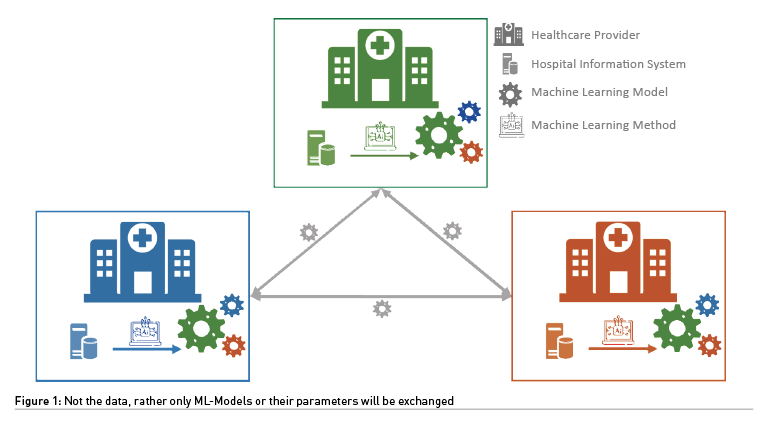HealthManagement, Volume 22 - Issue 3, 2022
Key Points
- Artificial Intelligence is playing an important role in taking better decisions across multiple sectors and the healthcare sector is not an exception.
- Rule of thumb: The larger the datasets the better the accuracy of machine learning methods.
- Healthcare data sharing is difficult because of some obvious reasons such as GDPR.
- New paradigm - learn from each other through sharing knowledge instead of sharing data.
- Methods such as federated learning, swarm learning and transfer learning enable us to exchange knowledge across institutions with total data privacy.
- The healthcare sector shall create a space to develop such generalised machine learning models in order to provide personalised, precise medicine and healthcare.
Digitalisation of healthcare data and the beginning of digital transformation reshape individual organisations in many aspects such as optimising healthcare processes, providing better healthcare, changing values, attitudes, and strategies and of course taking better decisions. Introduction of national wide Electronic Health Records (EHR) not only enables exchange of patients’ healthcare data in between healthcare stakeholders but also enables interoperability of collected data. The metaphor of the subconscious as a model for rethinking healthcare (Leodolter 2015) can help promote partly autonomous healthcare providers to coordinate themselves like a self-controlling system. This includes the way to work with patients’ healthcare information to provide personalised medicine and healthcare.
Parallel to medicine and healthcare, which are two paramount aspects of each healthcare provider within strict boundaries, the time has come to gain insights across the whole industry. We can do more as we humans learn from each other. Likewise, the larger the network of healthcare providers, the more we can learn from each other. We need a transformation to make use of AI in healthcare effectively - a new paradigm to gain insights from multiple healthcare providers with total data privacy: Exchange the knowledge gained from each individual institutional data through machine-learning methods/models within the network of healthcare providers instead of sharing the data is the idea (Li et al. 2020).
Hospitals are in the process of standardising the exchange of information following the data privacy regulations with their limitations. In the last decade, we have seen the concepts of Artificial Intelligence (AI) emerging into our daily lives helping us in taking better decisions. They are also more and more becoming part of this “subconscious minds” of organisations. The healthcare field is not an exception. The results of AI are promising in application of data driven machine-learning methods in predicting certain clinical events with good accuracy thus improving prevention and care.

The classical machine learning methods require data accumulation at a single location. Each healthcare provider usually hosts the data of her patients and uses the data primarily to provide medicine, healthcare and documentation. In a secondary use of the data, each healthcare provider’s patients’ data can act as a data lake to apply machine-learning methods. These methods acquire knowledge along with certain institutional data attributions in the form of models. Although various machine-learning models have been developed using EHR data recently, there is a need for external validation of these models in order to develop generalised models that discriminate reasonably across various multi-institutional cohorts. However, such studies are often difficult to perform due to data sharing limitations. Even when the data is anonymised for sharing, the anonymity can be compromised.
Techniques such as federated learning, swarm learning, and transfer learning among few others are emerging with favourable results in exchanging the knowledge - in other words: exchanging and merging machine-learning models instead of data. Although there are slight differences in afore mentioned methods, the general idea is to keep the data safe and do the learning in total data privacy.
Federated learning is described as the aggregation of models that have been developed at individual healthcare providers (Brisimi et al. 2018). Swarm learning, model parameters are communicated within the network of healthcare providers during the learning process. Learning can be either sequential or parallel with prior consensus (Warnat-Herresthal et al. 2021). Both federated learning and swarm learning deals with a single clinical event whereas transfer learning (Torrey and Shavlik n.d.) deals with the big picture, where the models are trained with large sets of data to acquire knowledge at a higher level and then learn at individual healthcare providers for specific use case.
The European Union artificial intelligence regulations released in April 2021 are encouraging institutions to use AI responsibly. With these developments, we envision that the institutions create space for the innovation to progress knowledge exchange. There is a potential in gaining generalised insights of various epidemiological conditions throughout the complete healthcare industry in order to provide personalised, precise medicine and healthcare.
Conflict of Interest
None.
References:
Brisimi TS, Chen R, Mela T et al. (2018) Federated learning of predictive models from federated Electronic Health Records. Int. J. Med. Inf. 112:59-67.
Leodolter W (2015) Das Unterbewusstsein von Organisationen: neue Technologien - Organisationen neu denken. Springer Gabler, Berlin Heidelberg.
Li T, Sahu AK, Talwalkar A, Smith V (2020) Federated Learning: Challenges, Methods, and Future Directions. IEEE Signal Process. Mag. 37:50–60.
Torrey L, Shavlik J (n.d) Transfer Learning.
Warnat-Herresthal S, Schultze H, Shastry KL et al. (2021) Swarm Learning for decentralized and confidential clinical machine learning. Nature 594:265–270.





